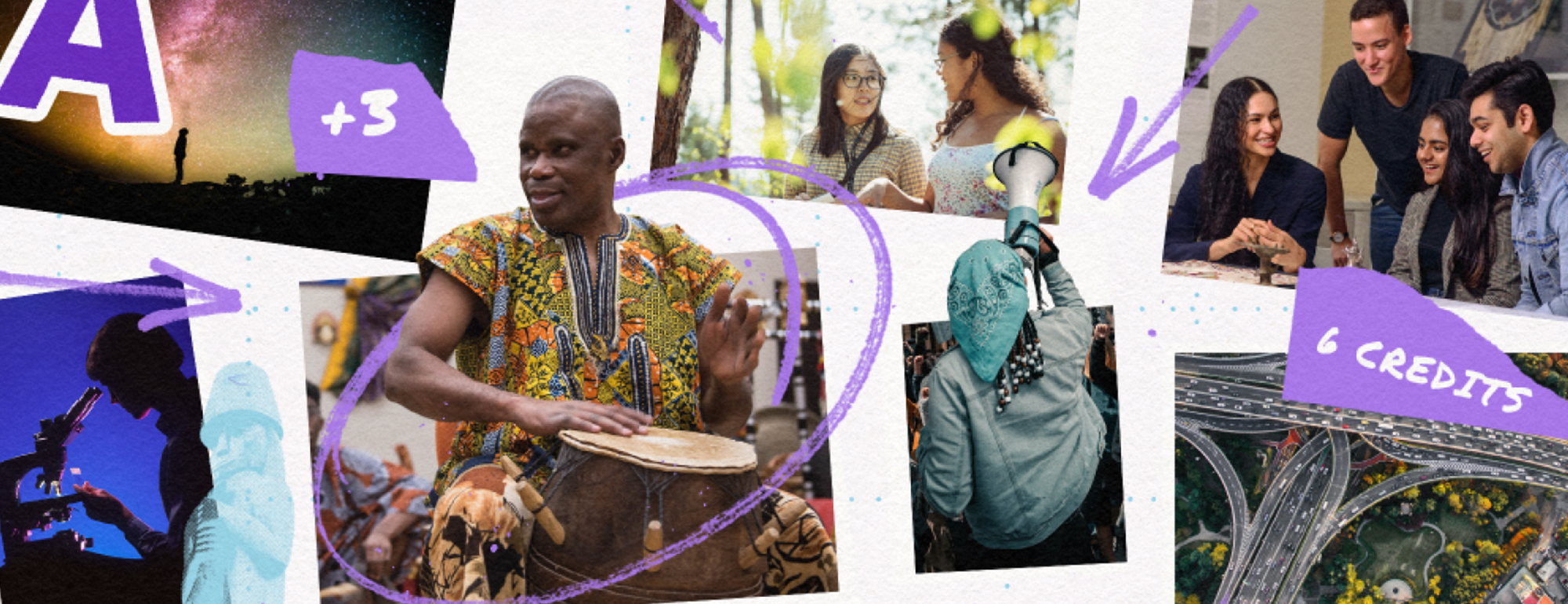Explore and create different course combinations to fulfill your Bachelor of Arts (BA) Ways of Knowing Breadth Requirements.
To get started, follow each step below.
Find your intended major below and click or drag and drop it into the box on the right.
Note that some majors permit admission only through a competitive application process, while others may be self-declared.
Social & Behavioural Systems
ANTHAnthropology
CDSTCanadian Studies
COGSCognitive Systems
ECONEconomics
GEOGGeography
INTRInternational Relations
LINGLinguistics
POLIPolitical Science
PSYCPsychology
SOCISociology
SPSCSpeech Science
USSTUnited States Studies
URSTUrban Studies
Humanities & Creative Arts
AMNEAncient Mediterranean & Near Eastern Stds.
ARTHArt History & Visual Culture
ASASAsian Area Studies
ASLCAsian Language & Culture
CINECinema Studies
CRWRCreative Writing
ENGLEnglish
FIPRFilm Production
FNELFirst Nations & Endangered Languages
FNISFirst Nations & Indigenous Studies
GRSJGender, Race, Sexuality & Social Justice
HISTHistory
HIPHHistory & Philosophy of Science
LTASLatin American Studies
MDVLMedieval Studies
MESTModern European Studies
MUSCMusic
PHILPhilosophy
RMSTRomance Studies
RGSTStudy of Religion
THTRTheatre
VISAVisual Arts
Language as Meaning
FRLCFrench Language, Literature & Cultures
GERNGerman
SPANSpanish
Natural & Physical Science
CPSCComputer Science
MATHMathematics
arrow_back_ios
arrow_forward_ios
Select one subject from each remaining breadth area - you can choose whether to take 9, 6 or 3 credits within each subject. These credits may be completed as electives or within a minor or other secondary program of study. To remove a course code you've selected, click on the box or replace it with another option.
Social & Behavioural Systems
ANTHANTH
Anthropology
ARCLARCL
Anthropological Archaeology
ECONECON
Economics
ENSTENST
Environment and Sustainability
FMSTFMST
Family Studies
GEOGGEOG
Geography
INFOINFO
Information Studies
LASOLASO
Law and Society
LINGLING
Linguistics
POLIPOLI
Political Science
PSYCPSYC
Psychology
PPGAPPGA
Public Policy and Global Affairs
SOCISOCI
Sociology
SOWKSOWK
Social Work
URSTURST
Urban Studies
Humanities & Creative Arts
ACAMACAM
Asian Canadian Asian Migration Stds.
AFSTAFST
African Studies
AMNEAMNE
Ancient Mediterranean & Near Eastern Stds.
ARTHARTH
Art History
ASIAASIA
Asian Studies
ASIXASIX
Asian Studies Crossings
CDSTCDST
Canadian Studies
CENSCENS
Central, Eastern & Northern European Stds.
CINECINE
Cinema Studies
CRWRCRWR
Creative Writing
CSISCSIS
Critical Studies in Sexuality
ENGLENGL
English
FIPRFIPR
Film Production
FNISFNIS
First Nations & Indigenous Studies
GMSTGMST
German Studies
GRSJGRSJ
Gender, Race, Sexuality & Social Justice
HISTHIST
History
JRNLJRNL
Journalism
LASTLAST
Latin American Studies
MDIAMDIA
Media Studies
MDVLMDVL
Medieval Studies
MESMES
Middle East Studies
MUSCMUSC
Music
NORDNORD
Nordic Studies
PHILPHIL
Philosophy
RGSTRGST
Study of Religion
RMSTRMST
Romance Studies
SCANSCAN
Scandinavian
SLAVSLAV
Slavic Studies
THFLTHFL
Theatre and Film
THTRTHTR
Theatre
VISAVISA
Visual Arts
WRDSWRDS
Writing Studies
Language as Meaning
ASLAASLA
Asian Languages
ARBCARBC
Classical Arabic
ARBMARBM
Modern Standard Arabic
ASLASL
American Sign Language
CHINCHIN
Chinese
CNTOCNTO
Cantonese
CTLNCTLN
Catalan
DANIDANI
Danish
FNELFNEL
First Nations & Endangered Languages Program
FRENFREN
French
GERNGERN
German
GREKGREK
Greek
HEBRHEBR
Hebrew
HINUHINU
Hindi-Urdu
ITALITAL
Italian
INDOINDO
Indonesian
JAPNJAPN
Japanese
KORNKORN
Korean
LATNLATN
Latin
NEPLNEPL
Nepali
PERSPERS
Persian
POLSPOLS
Polish
PORTPORT
Portuguese
PUNJPUNJ
Punjabi
RUSSRUSS
Russian
SANSSANS
Sanskrit
SEALSEAL
Southeast Asian Languages
SOALSOAL
South Asian Languages
SPANSPAN
Spanish
SWAHSWAH
Swahili
SWEDSWED
Swedish
TIBTTIBT
Tibetan Languages
UKRNUKRN
Ukrainian
YDSHYDSH
Yiddish
Natural & Physical Science
ASTRASTR
Astronomy
ATSCATSC
Atmospheric Science
BIOCBIOC
Biochemistry
BIOLBIOL
Biology
BIOTBIOT
Biotechnology
CAPSCAPS
Cellular, Anatomical & Physiological Sci.
CHEMCHEM
Chemistry
COGSCOGS
Cognitive Systems
CPSCCPSC
Computer Science
DSCIDSCI
Data Science
ENPHENPH
Engineering Physics
ENVRENVR
Environmental Science
EOSCEOSC
Earth and Ocean Sciences
FSCTFSCT
Biochemistry and Forensic Science
GEOSGEOS
Geographical Sciences
ISCIISCI
Integrated Sciences
MRNEMRNE
Marine Science
MATHMATH
Mathematics
MICBMICB
Microbiology
NSCINSCI
Neuroscience
PCTHPCTH
Pharmacology and Therapeutics
PHYSPHYS
Physics
STATSTAT
Statistics
arrow_back_ios
arrow_forward_ios
Place and Power courses encourage students to think beyond inherited colonial thought processes as they resonate specifically in what is now known as British Columbia.
Place & Power Courses
ACAM 300ACAM 300
Dis/Orienting Asian Canada
ANTH 329ANTH 329
Indigenous Issues in Global Perspective
ARTH 262ARTH 262
Indigenous Art of North America
ARTH 377ARTH 377
Arts of the Northwest Coast Peoples
ARTH 343ARTH 343
Inventing Canada Through Art
ASIX 220ASIX 220
Indigeneities in Asia and Asian Diaspora
ASIX 300BASIX 300B
Indigenous Environmentalisms in Asia
ASTU 200ASTU 200
Special Topics Place & Power
ASTU 399ASTU 399
Special Topics Place & Power
CENS 203CENS 203
Indigenous Arctic Art & Activism
CENS 319CENS 319
Languages, Place, and Power
CRWR 220CRWR 220
Intro. to Creative Writing with an Indigenous Focus
ENGL 228ENGL 228
Intro. to Reading Place & Power in Vancouver & BC
GEOG 210GEOG 210
Vancouver & Its Region
GEOG 319GEOG 319
Environmental Impact Assessment
GEOG 328GEOG 328
Constructing Canada
GEOG 355GEOG 355
Geographies of Urban Indigeneity
GEOG 446BGEOG 446B
Oceanic Geographies
HIST 107HIST 107
Global Indigenous Histories
HIST 400HIST 400
Practice of Oral History
NORD 340NORD 340
Sámi Histories and Cultures
NORD 341NORD 341
Indigenous Activism
PHIL 102-004PHIL 102-004
Place and Power
POLI 304POLI 304
British Columbia Government & Politics
RMST 326RMST 326
Francophone Indigenous Literatures and Cultures
SOCI 295SOCI 295
BC Disasters, Power, & Inequality
SOCI 364SOCI 364
Built Environments
Use this list to continue planning your courses or start over to explore different options.
Major in:
Course Code:
Breadth Area:
9 CREDITS in:
Course Code:
Breadth Area:
6 CREDITS in:
Course Code:
Breadth Area:
3 CREDITS in:
Course Code:
Breadth Area:
PLACE & POWER in:
Course Code:
Please note that this list is for planning purposes only and does not indicate your final course selections for graduation. This tool in no way guarantees enrolment in any of the selected courses. Note that some of the courses listed above have prerequisites.
For more information about your degree requirements, visit the BA Degree Requirements page on the Faculty of Arts website. If you have questions, please connect with Arts Academic Advising.
MAJOR
9 CREDITS
6 CREDITS
3 CREDITS
PLACE & POWER
CLEAR ALL

